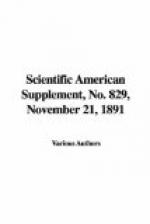MECHANICAL COLD.
The third element in the action of cold is more purely mechanical, and this, though in a sense secondary, is of immense import. When any body, capable of expansion by heat, that is to say, by radiant motion of its own particles, is reduced in temperature, it loses volume, contracts, or shrinks. The animal body is no exception to this rule; a ring that will fit tightly to the warm finger will fall off the same finger after exposure to cold. The whole of the soft parts shrink, and the vessels contract and empty themselves of their blood. Cold applied to the skin in an extreme degree blanches the skin, and renders it insensible and bloodless, so that if you prick it it does not bleed, neither does it feel. In cases where the body altogether is exposed to extreme cold this shrinking of the external parts is universal; the whole surface becomes pale and insensible; the blood in the small vessels superficially placed is forced inward upon the heart and vessels of the interior organs; the brain is oppressed with blood; sleep, or coma, as it is technically called, follows, and at last life is suspended.
In exposure to the lowest wave of temperature in this country these extreme effects are not commonly developed; but minor effects are brought out which are most significant. In particular, the effect on the lungs is strongly marked. The capillary vessels of the lungs, making up that fine network which plays over the computed six hundred millions of air vesicles, undergo paralysis when the cold air enters, and in proportion as such obstruction from this cause is decisive, the blood that should be brought to the air vesicles is impeded, and the process of oxidation is mechanically as well as chemically suppressed. The same contraction is also exerted on the vessels of the skin, driving the blood into the interior and better protected organs. Hence the reason why on leaving a warm room to enter a cold frosty air there is an immediate action of the visceral organs from pressure of blood on them, and not unfrequently a tendency to diarrhoea from temporary congestion of the digestive tract. Three factors are at work, in fact, whenever the low wave of temperature affects the animal body; abstraction of heat from the body, beyond what is natural; arrest of chemical action and of combustion; paralysis of the minute vessels exposed to the cold.
COMBINED EFFECTS.
We cannot view the extent of change in the organic life induced by the low wave of heat without seeing at once the sweep of mischief which exposure to the wave may effect. It exerts an influence on healthy life in the middle-aged man, and I know of no disease which it does not influence disastrously. Is the healthy man exhausted, it favors internal congestion; has he a weak point in the vascular system of his brain, it renders that point liable to pressure and




